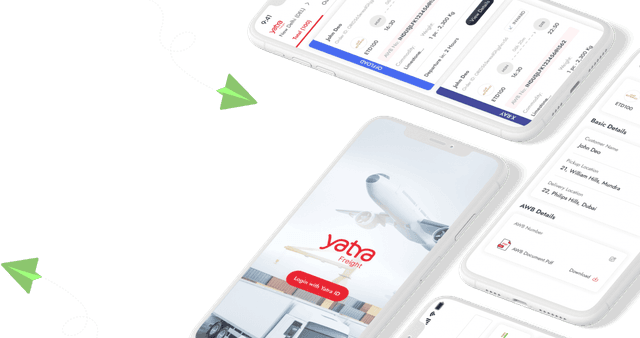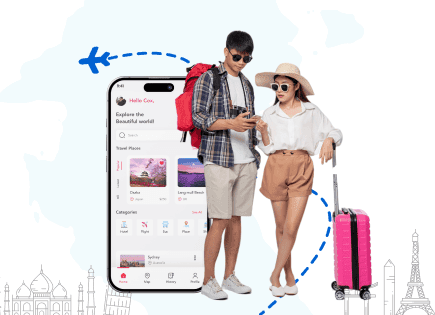Table of Content
How to Use AI and Automation to Boost B2B Travel Revenue?
Table of Content

The travel industry is booming, and one of the most promising avenues of growth is the B2B travel segment.
B2B travel caters to corporate clients and travel business owners looking to organize efficient business travel, plan corporate retreats, and offer travel as an incentive to their employees. It helps corporate travelers plan their trips and itineraries, book hotels and flights, monitor and track disruptions, and create attractive vacation packages.
It is already valued at over $30 billion and is expected to grow by 10% annually until 2032.
The increased use of AI in travel is a huge reason for this projected growth. With the help of the travel app development company, it empowers corporate travel agents and business travel managers with cutting-edge technology and unparalleled insights into B2B travel.
For instance, it gives unprecedented access to data on real-time booking availability. It also enables payment and currency integration while supporting corporate risk and expense management systems.
But how exactly can AI increase your B2B travel revenue?
How exactly can you enable your B2B clients to use artificial intelligence for travel planning?
How can you benefit from the intersection of the travel industry and the use of generative AI?
In this blog, we’ll use real-life examples of how you can harness the power of AI in travel to boost your B2B travel revenue.
How AI in Travel Can Empower Your B2B Travel Business?
The rise of Artificial Intelligence in the travel and hospitality industry is indisputable. Nearly 40% of leisure travelers are already happy with AI-based travel recommendations.
But how exactly will it cater to the needs of your business travelers and travel agents?
Corporates and business travelers want a smooth travel experience that removes uncertainty and provides comfort.
Here’s how you can use AI to provide for the needs of your B2B travelers.

Personalization
78% of corporate travel managers say they seek personalized travel options when choosing a B2B travel management platform.
Further, corporate travel planners say they prefer a platform that provides users with customized profiles and a loyalty program.
AI can equip a B2B travel platform with precisely these features:
Efficient profile management tailored to individual employees where they can keep track of upcoming business trips and view booking arrangements.
Innovative loyalty programs encourage corporations and companies to undertake more business-related travel by providing frequent traveler benefits and complementary accessory services.
Itinerary and Risk Management
In business travel, disruption can be worth millions of dollars. Thus, business travel managers want comprehensive itinerary planning features that account for individual preferences, such as preferred mode of travel, dietary requirements, and room-sharing needs.
Predictive analytics take into account local updates, weather alerts and government advisories to assess the risk to your B2B travelers and provide them with the most secure alternatives, including destinations and travel routes.
Integration with Expense Management
A third concern of B2B travel managers is expense management. On the one hand, they value personalized, seamless travel experiences provided by business travel apps. On the other hand, they also need to know exactly what a business trip costs.
AI tools can help your B2B travelers create and share real-time expense reports with their corporate travel managers. Some AI features can even help B2B clients save up to 20% on their travel expenses through VAT recovery solutions that rely on automated invoicing.
Further, AI tools offer comprehensive integration with expense management platforms used by large corporations to track real-time expenses for every business trip and individual employee.
Thus, AI can also help business travel management find flights, hotels and cabs tailored to the needs of specific employees that fit the company’s budget.
Find out how we helped Yatra become a travel giant valued at over $250 million by building a robust end-to-end travel management platform with cutting-edge AI tools.
View Live Demo
5 Ways to Boost B2B Travel Revenue with AI
Which features should you consider when building a B2B travel management platform? Here are the five key AI and automation features that can help you increase your B2B travel revenue:
1. Chatbots
 The chatbot is one of the most significant and useful applications of automation in the travel industry.
The chatbot is one of the most significant and useful applications of automation in the travel industry.
Chatbots can help B2B travel managers plan, book and manage business trips conveniently. It is one of the most important innovations of AI in travel management.
For instance, a travel manager can ask an AI-powered smart chatbot to plan a trip for four employees to an important industry expo or a critical client meeting.
The chatbot will plan the trip by taking into account:
The company’s travel and expenses,
Dining and accommodation preferences of the travelers,
Local commute time and distance to and from the expo/meeting location,
Additional services like concierge support and travel insurance.
The chatbot can also help corporate travel managers:
Change trip plans at the touch of a button,
Cancel bookings for specific users,
Rebook flights or hotels through messages,
Reschedule bookings due to change of plans,
Add accessory services to personalize the travel experience.
Plus, a chatbot helps travel management platforms provide seamless support to corporate and business travel managers while saving resources. It captures the impact of generative AI in tourism over the next decade.
2. Itinerary Planning
An overwhelming number of corporate travel planners look for itinerary planning services. They need to find flights, hotels and cabs that suit their employees’ preferences and their company’s budgets.
Today, most B2B travel companies provide itinerary planning services through templates and samples.
Generative AI can empower your B2B travel company to automate the planning process. It is one of the most sought-after features of AI in the travel industry.
Machine learning algorithms can analyze data from previous business trips to learn the preferences of a company and its customers. Generative AI can then curate corporate business trips based on the preferences of business travelers.
Here are some of the factors that an algorithm can take into account while building an itinerary:
The duration of the business trip,
The dates and lengths of individual meetings,
The city of origin and destination,
The prices of flights, accommodation and local transportation,
Personalized dietary and accommodation preferences,
Company compliance and safety policies.
It can then provide planning services for multiple trips simultaneously, catering to different cities, employees and schedules.
Thus, AI-powered tools can support the creation of complex itineraries that address:
Specific business situations: expos, mergers, client acquisition meetings and more.
Travel histories: the number of trips to the city, expenses of previous trips and the travelers' preferences.
Trip objectives: one-day emergency meetings, short business trips, week-long retreats and more.
Itinerary planning is thus one of the most important functions of automation in the travel industry.
You May Also Like : Travel App Development Guide
3. Expense Management Integration

As travel agents, tour operators or corporate travel management firms, you know your corporate and B2B clients are neither travel planners nor trip organizers.
However, they all have a universal measure of business travel - the expenses.
Most corporates and businesses use and integrate expense management systems to study their business expenses and revenue. Thus, one of the applications of AI in the travel industry is expense tracking and monitoring.
Business travel can become a major point where they hemorrhage money. Thus, you will likely win them over if your B2B travel platform is compatible with your clients’ existing expense management systems and can help them save money on business travel.
Here’s where AI and automation can help you. You can build a business travel platform that tracks and records all business expenses in the expense management system through automation and cloud-based solutions.
Thus, you can provide your B2B clients with a double advantage:
First, they can eliminate costly and time-consuming processes through which they track business expenses. Thus, you’ve reduced their tracking and monitoring costs.
Second, they can set up spending and expense protocols when they ask your platform to plan trips. This will help them limit their expenses per business trip and employee.
It should also be recalled that over half of all corporate travelers hail from small and medium enterprises (SMEs). Owing to their smaller travel budgets, SME clients will especially benefit from real-time expense tracking and limiting features.
However, with features like VAT recovery mechanisms and automated invoicing, you will also be in a position to attract corporate travel firms and big travel agencies.
4. Inventory and Vendor Management
As a B2B travel management company, you must deal with travel business clients and vendors with whom you book travel and accommodation. It is a significant way AI in travel and tourism will change how the industry organizes resources and presents them to the users.
AI can help you provide your clients with a seamless booking experience. But it can also help you organize, understand and access the supply side of B2B travel.
With AI and automation, you can create a travel management platform that can help you:
Track real-time availability of flights, hotel rooms and cabs,
Rank options depending on services offered, prices quoted and client feedback,
Gather end-user queries and solve vendor-related problems in real time,
Rank vendors based on trip outcomes and customer reviews at the end of trips.
An AI-backed inventory management system can help you communicate with:
Central reservation systems used by hotels,
Flight availability and pricing algorithms deployed by airlines,
Rail ticketing platforms,
Booking platforms of local car rental and cab agencies,
Corporate travel channel managers of your clients,
Hotel management software deployed for housekeeping and concierge services,
And more!
Thus, a tool that helps you organize inventory based on different factors and present it to your clients in an accessible format can greatly boost your B2B travel revenue.
5. Predictive Analytics
 Boosting revenue isn’t just about providing more services to more B2B clients. It is also about managing existing clients, understanding shifts in the B2B travel markets and diversifying the features you can provide to B2B prospects.
Boosting revenue isn’t just about providing more services to more B2B clients. It is also about managing existing clients, understanding shifts in the B2B travel markets and diversifying the features you can provide to B2B prospects.
Predictive analytics is one such cutting-edge feature that you can benefit from and provide to your B2B clients as well. It provides several benefits:
Risk Management
Corporate travelers are ambassadors of the company, so companies prefer to send them to the safest environment possible. Risk management is a critical factor for corporate travel.
You can also provide a risk profile for every trip you help a company plan. An AI-based risk management analysis relies on multiple factors, including:
New reports,
Weather alerts,
Travel advisories,
Local updates,
And more.
Based on these sources, predictive analytics utilize AI tools to analyze patterns and indicate the safest travel plan for corporate customers with minimal disruption.
It can help your B2B clients detect sudden shifts in weather or political disruption and suggest secure routes or alternative destinations to protect their customers.
Thus, it is a huge asset for corporate travel managers.
Detecting Business Leads
Apart from your clients, predictive analytics can help you understand the demand and supply trends of your B2B travel services. It can tell you:
Industry-specific order volumes and frequency,
The performance of the vendors you hire and work with,
Which segment is on the rise in making corporate bookings,
What loyalty programs are most popular with corporate customers,
What features corporate clients are looking for in their business travel platforms.
Thus, predictive analytics captures the significant impact of artificial intelligence in the travel and hospitality industry.
It can help you boost your B2B revenue by anticipating corporate travel bottlenecks and giving you the tools to smooth them over.
It can also tell you which clients might want accessory services like lounge benefits, concierge services and international visa services.
How Green Apex empowers seamless B2B travel management through AI-driven solutions?
In the next 10 years, the B2B travel industry will grow to more than $73.5 Billion.
But by then, it will be too late to pivot into the segment and carve out a competitive advantage for your travel business.
So, whether you’re already into the B2B travel business or are looking to pivot to the segment by increasing your B2B travel revenue, we’re here to help!
We work to empower corporate travel agents and business travel managers by bringing together the travel industry and the use of generative AI solutions.
Connect with our AI developers, and let us craft a B2B travel management platform designed for success and profitability.
Related Blogs

How Your Healthcare Business Can Scale with a Heart Monitoring App Development?
The average spending of people on healthcare apps like telemedicine, fitness tracker, heart monitoring devices, and other health tracking apps with...

The Ultimate Travel App Development Guide: Features, Cost, and Development Process
The travel business is changing. Before people traveled physically to their desired destinations, but now ...

8 Things to Have an Upper Hand On Before Developing Your 1st Android App
Living in a digital-only era, we use our phones while in the office, on the streets, in our cars, at home, while we're eating, relaxing in the bed,...















